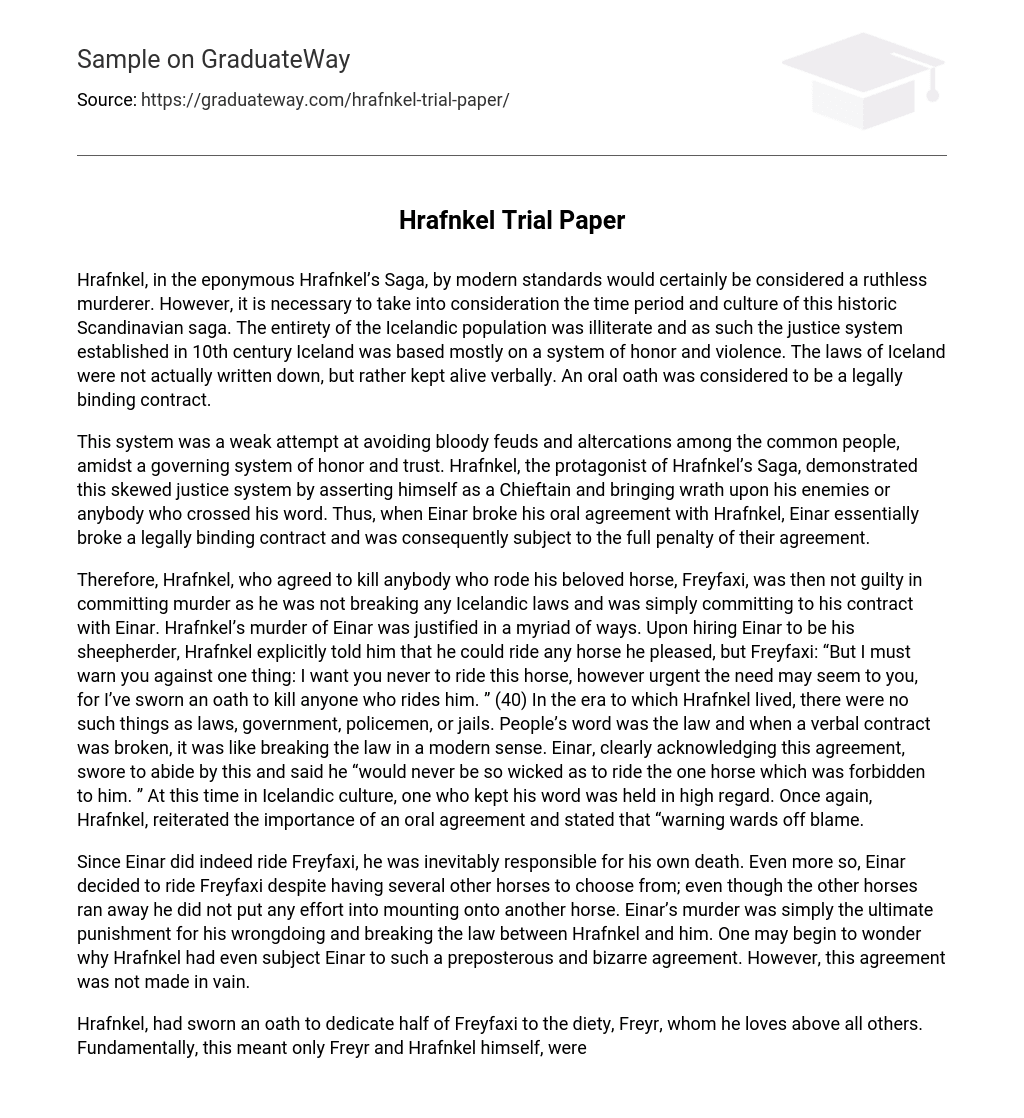In the eponymous Hrafnkel’s Saga, Hrafnkel would definitely be classified as a merciless killer according to today’s standards. Nevertheless, it is crucial to take the time period and culture of this historic Scandinavian saga into account. The entire population of Iceland was unable to read and write, therefore the justice system established in 10th century Iceland relied heavily on a system of honor and violence. The laws of Iceland were not documented, but rather conveyed orally. A verbal oath was considered to be a legally binding agreement.
The system in place was an ineffective effort to prevent violent conflicts and disputes among the general population within a governing structure based on honor and trust. Hrafnkel, the main character of Hrafnkel’s Saga, showed the flaws in this justice system by asserting his authority as a Chieftain and seeking revenge against his enemies or anyone who betrayed him. Therefore, when Einar violated his verbal agreement with Hrafnkel, Einar essentially violated a legally binding contract and was thus liable to face the severe consequences outlined in their agreement.
Therefore, Hrafnkel’s act of killing Einar, who rode his beloved horse, Freyfaxi, can be seen as justified as he was fulfilling his contractual obligation. Hrafnkel was not breaking any Icelandic laws but rather committing to his agreement with Einar. Hrafnkel explicitly warned Einar not to ride Freyfaxi, as he had sworn an oath to kill anyone who did so. In that era, there were no formal laws or authorities, and people’s word held legal weight. Breaking a verbal contract was regarded as breaking the law in a contemporary sense. Einar acknowledged this agreement and pledged to never ride the forbidden horse. Keeping one’s word was highly respected in Icelandic culture at the time. Hrafnkel emphasized the significance of their oral agreement once again, stating that a warning prevents blame.
Einar’s death was ultimately his own responsibility, as he chose to ride Freyfaxi despite having other horses available to him. Despite the other horses fleeing, Einar made no effort to choose another horse. This decision was a violation of the agreement between Hrafnkel and himself, making his murder a fitting punishment for his wrongdoing. The reasoning behind why Hrafnkel subjected Einar to such an unusual agreement may raise questions. However, this agreement was not without purpose.
Hrafnkel swore an oath to dedicate half of Freyfaxi to his beloved deity, Freyr. This meant that only Freyr and Hrafnkel himself were allowed to ride Freyfaxi. At the beginning of the saga, Hrafnkel’s love for Freyr was evident when he built a large temple at Adalbol and performed grand sacrifices to the gods. Among all the gods, he loved Freyr the most and shared half of his best treasures with him. As a result, Hrafnkell became known as Freysgodi due to his intense affection for this god.
Earlier, it was shown that Freyr played a significant role in the chieftain’s religion. Therefore, Hrafnkel considered it sacrilegious when Einar chose to ride Freyfaxi. Hrafnkel saw the dirty and sweaty condition of Freyfaxi as a sign of mistreatment and considered it an illness. He vowed to seek revenge for his friend. Although Einar appeared to be a good and hard-working man and Hrafnkel’s actions were severe, Hrafnkel did not break any laws. On the other hand, Einar violated the oral agreement, which was a legally binding contract, and caused harm to Freyfaxi.
The primary reason for killing Einar was his breach of contract with Hrafnkel. However, it was the culture of Iceland which relied on trust and honor that provided the necessary justification for Hrafnkel’s actions. The code of trust dictated that if someone was deemed untrustworthy, their elimination was necessary to maintain peace and order in the community. Additionally, Hrafnkel fulfilled his duty as an Icelander by offering compensation to Einar’s grieving family. Hrafnkel’s offer of food and items to Einar’s father, Thorbjorn, was exceedingly generous.
Hrafnkel adhered to the laws and traditions of Icelandic society, which made him a “hero” in Hrafnkel’s Saga. According to various internet sources, a saga is a lengthy narrative showcasing achievements and recounting the stories of honorable individuals. Consequently, Hrafnkel cannot be considered guilty by his fellow Icelanders or readers. Through careful evaluation of Hrankel’s Saga, it becomes evident that Hrafnkel was completely innocent in the killing of Einar. In accordance with the justice ideals prevalent in 10th century Iceland, Hrafnkel was justified in punishing Einar for breaching their oral agreement.
By breaking this agreement, Einar also violated Hrafnkel’s pledged oath to the deity Freyr, with whom he shared Freyfaxi. Hrafnkel’s violent actions, while harsh and insane by today’s standards, were legally justified in the Icelandic system. Rather than judging the tale as a story of murder and dictatorship, it is important to comprehend the civilization that once existed. In the proper context, Hrafnkel can be seen as a hero who upheld Icelandic traditions, laws, and honor, and in doing so, became a more understanding, respected, and prosperous Chieftain.





